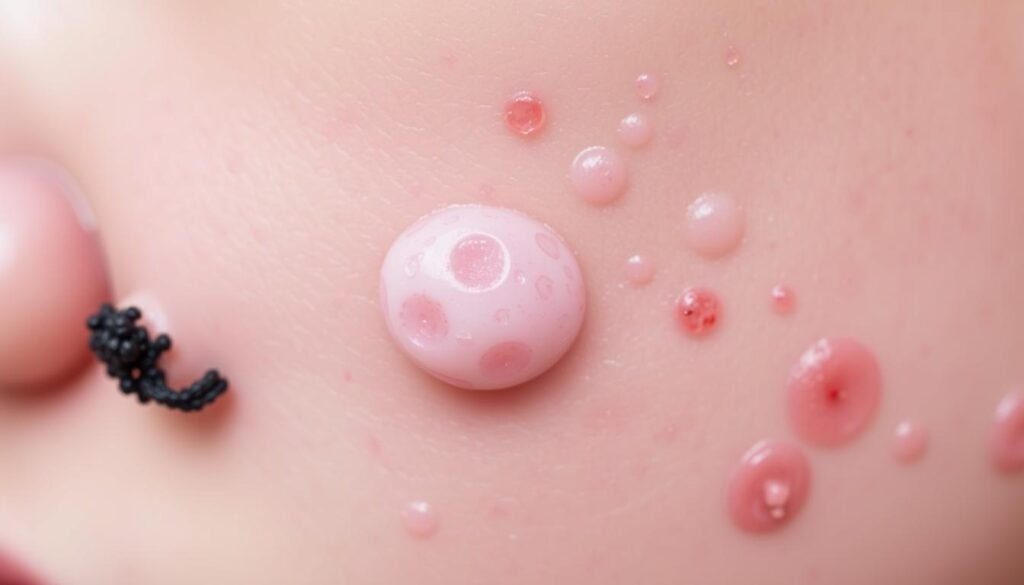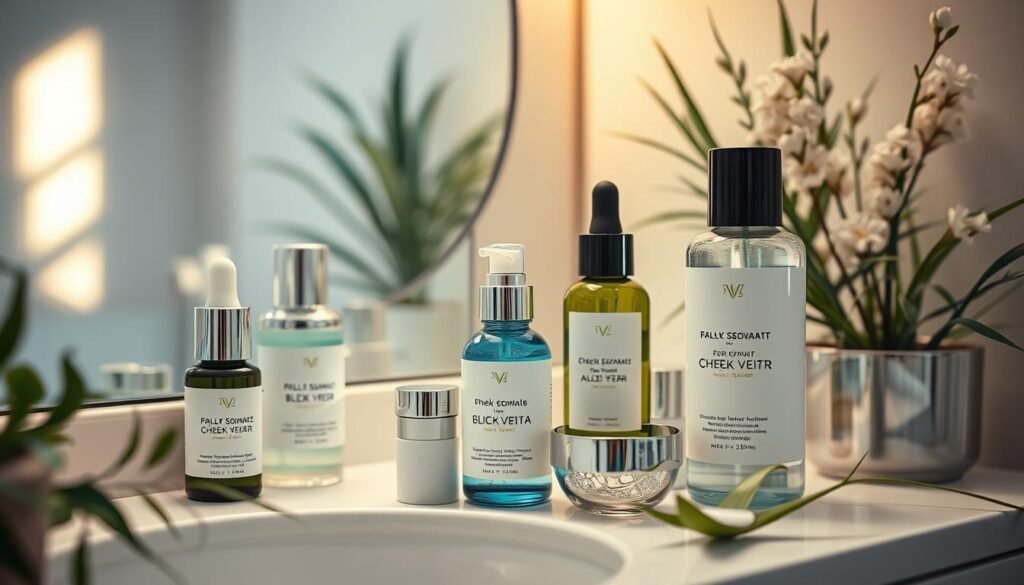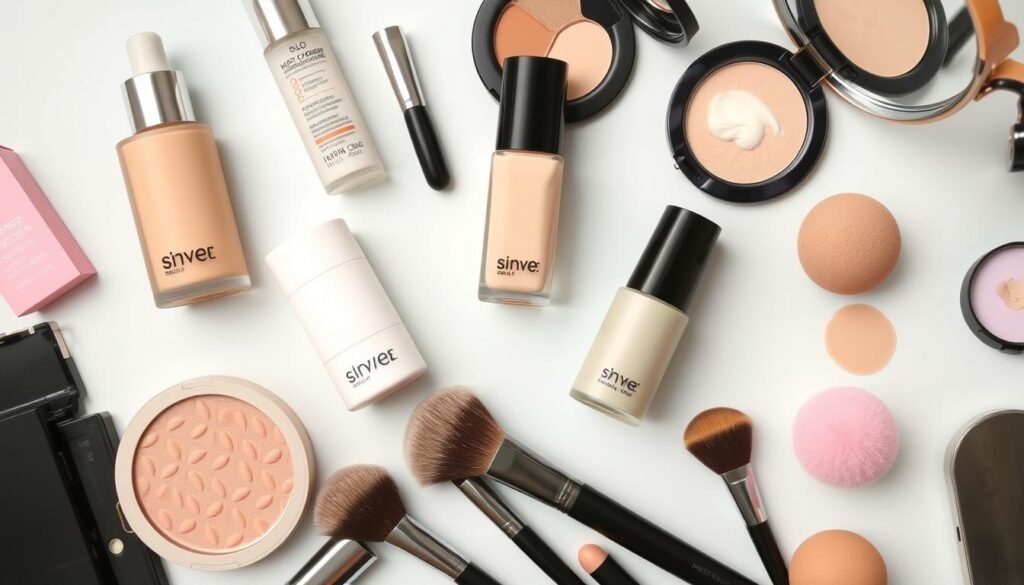Did you know acne pimples often clear up in one to two weeks? This issue, especially cheek pimples, is frustrating for many. People face it before big events often. There are many solutions like chemical peels, antibiotics, and hormonal therapies for facial acne.
It’s vital to understand why cheek acne happens. Hormonal changes, clogged pores, and bacteria lead to pimples. We’ll look at these causes and offer quick ways to get clearer skin.
Key Takeaways
- Acne pimples typically take one to two weeks to clear on their own.
- Severe acne may require weeks to resolve, even with treatment.
- Common acne antibiotics include tetracycline, minocycline, and doxycycline.
- Hormonal treatments and contraceptives can effectively address acne triggered by hormonal imbalances.
- Preventative tips for cheek acne include changing pillowcases weekly and maintaining clean skincare tools.
Introduction to Pimples on the Cheek
Cheek acne means pimples on the face’s cheek area. It’s common across different ages, hitting teens and adult women hard. It happens due to extra oil, clogged pores, and germs.
Dealing with cheek acne is emotionally tough. It can hurt how one sees themselves, causing shame and worry. This is true for important occasions or daily social interactions. Knowing what causes cheek acne can help people find the right treatment and feel better about themselves.
Making changes in how one cares for their skin and eats can lessen cheek acne. Getting to know about this condition is the first step towards better skin.
What is a Pimple?
A pimple is a small, inflamed bump on the skin. It happens when pores get clogged. Dead skin cells and too much oil gather, causing blockages. Bacteria trapped in these clogs make the inflammation worse.
Knowing how pimples form can help people tackle their skin issues better. Pimples come in several types, like whiteheads and pustules. They have common causes. Hormone changes, bad skincare, and the environment play big roles in causing them.
https://www.youtube.com/watch?v=ys_R4KZYj24
If you’re fighting skin inflammation, look at your skincare habits. Use gentle products that don’t block pores. This might lower acne’s impact. Studies show that eating better and less stress can improve your skin. They help reduce pimple outbreaks.
| Factors Contributing to Pimples | Impact |
|---|---|
| Hormonal changes | Can exacerbate oil production, leading to clogged pores |
| Poor skincare routine | Increases the risk of acne breakouts and skin inflammation |
| Environmental elements | May contribute to the accumulation of dirt and bacteria on the skin |
| Bacteria transfer | Touching the face or using unclean objects can worsen existing acne |
Understanding the Causes of Pimples on the Cheek
Pimples on the cheek come from many sources, each affecting our skin. Hormonal changes are major players, often causing frequent breakouts. These changes, like during menstruation or pregnancy, lead to an imbalance. This might make our skin produce more sebum than it should, helping acne to form.
Hormonal Changes and Imbalances
Hormones greatly affect the health of our skin. Almost 85% of women face breakouts before their periods. This shows how strong the link between hormones and acne is. When our hormones shift, our skin might make more oil. This can clog pores and cause more breakouts.
Clogged Pores and Skin Inflammation
Clogged pores are a big reason for cheek acne. This happens when dead skin cells, oil, and dirt build up. Such a mix sets the stage for inflammation and more serious acne types. Using exfoliating cleansers with salicylic acid is a good way to fight this problem.
Bacterial Infections as a Contributing Factor
Bacterial infections also lead to acne. Clogged pores create a home for bacteria, making inflammation worse and pimples appear. To handle acne, treatments that kill skin bacteria are often used. If acne won’t go away, seeing a dermatologist can help with special treatments. For more on how to treat acne, check out these resources.
| Cause | Effect | Prevention |
|---|---|---|
| Hormonal Imbalance | Increased sebum production leading to acne | Monitor hormonal changes, consider prescription options if needed |
| Clogged Pores | Creates an environment for acne formation | Regular exfoliation and cleansing routine |
| Bacterial Infections | Exacerbates inflammation, leading to more severe acne | Use topical treatments with antibacterial properties |
Types of Facial Blemishes Related to Cheek Acne
It’s key to know the different types of facial blemishes that come with cheek acne for better treatment. There are varieties like blackheads, whiteheads, and cystic acne. Each type has its own features and needs a special way to be handled.
Blackheads
Blackheads are tiny, dark bumps that happen when pores open up and get filled with dead skin and oil. Their dark color comes from oxidation, which some people wrongly think is dirt. To treat blackheads, gently exfoliating and using products with salicylic acid or glycolic acid is advised. These products help remove impurities and stop blockages from happening again.
Whiteheads
Whiteheads look like small, raised bumps that are trapped under the skin because the pores are closed and clogged. The buildup of too much oil and dead skin also causes them, just like with blackheads. To deal with whiteheads, using creams or having a professional gently extract them is suggested.
Cystic Acne
Cystic acne is known as the toughest type, showing up as big, sore lumps under the skin. It’s usually related to hormones and can leave bad scars if not taken care of right. Dealing with cystic acne might require taking medicine by mouth or using isotretinoin. Always speak to a dermatologist. A thorough plan is often needed to control symptoms and lower the chances of more breakouts.

| Blemish Type | Characteristics | Treatment Options |
|---|---|---|
| Blackheads | Open clogged pores, dark appearance | Exfoliation, salicylic acid products |
| Whiteheads | Closed clogged pores, flesh-colored or white lumps | Topical treatments, professional extraction |
| Cystic Acne | Large, painful lumps beneath skin | Oral antibiotics, isotretinoin, dermatologist consultation |
Pimple on Cheek: Impact on Self-Confidence
Having a pimple on the cheek can really affect a person’s self-esteem and how they see their body. When people get facial blemishes, it often makes them feel bad inside. They may worry a lot and avoid hanging out with others. These feelings can make even easy talks seem hard.
Studies show that acne can make people think less of themselves. Those with acne might get bullied, feeling lonely and upset. Teen girls especially find this tough, as they deal with feeling unattractive.
If acne lasts a long time, it can make emotional issues worse. Skin problems can lead to scars and deep emotional pain. Getting help quickly helps heal the skin and mind. In the U.S., women with severe acne feel more self-conscious than men and might skip social events.
Acne seriously affects happiness and self-worth. Both men and women with acne feel bad about themselves. In South Korea, teens reported stress and bad social lives because of acne. Girls felt worse than boys.
Some people become overly worried about their skin flaws, which harms their self-esteem. They might feel constantly anxious about how they look. Knowing how acne affects emotions helps in treating it fully. This means caring for both the mind and body.
Quick Treatment Solutions for Pimples on the Cheek
There are some quick solutions for cheek pimples that give fast relief. These methods reduce irritation quickly. They are great for those looking for effective, timely treatment options.
Applying Ice to Reduce Swelling
Using ice is a simple, effective way to lessen swelling. It tightens blood vessels, cutting down on inflammation and redness. This method can make a big difference, especially before big events.
Utilizing Aspirin Paste for Spot Treatment
Aspirin, with salicylic acid, is good for spot treating pimples. Make a paste by crushing an aspirin and mixing it with water. Apply it directly to the pimple to decrease swelling and inflammation. This helps pimples look better.
Over-the-Counter Acne Medications
Over-the-counter acne medications often make a big difference. They have ingredients like salicylic acid or benzoyl peroxide that fight bacteria and unclog pores. These acne medications are easy to find. They work well if used regularly. Check out acne treatment guides for more info.

Importance of a Good Skincare Routine
A good skincare routine is key for preventing acne and keeping your skin healthy. If you have acne, the right skincare can clear your skin or prevent breakouts. Start with gentle cleansers that match your skin’s pH, around 5.5, to avoid irritation.
Your routine should clean, exfoliate gently, and hydrate your skin well. This helps stop oil and dead cells from clogging pores. Use moisturizers with hyaluronic acid or ceramides to keep skin moist without blocking pores. Ingredients like salicylic acid and benzoyl peroxide are great for fighting acne and preventing spots.
Never skip sunscreen. It protects your skin from the sun’s rays, especially when using products that make your skin more sensitive. A good routine includes morning and night care, removing make-up, applying treatments like retinoids, and moisturizing before bed.
Change your routine with the seasons, using richer moisturizers in the winter, to keep your skin healthy. For tips on a daily skincare routine for acne, check out the guide here.
Makeup Tips for Concealing Cheek Pimples
Choosing the right makeup is key to hide cheek pimples and look flawless. If you have acne-prone skin, go for non-comedogenic products. These don’t clog pores. Also, use products with acne-fighting ingredients to tackle problems and cover up.
Choosing Non-Comedogenic Products
Dermatologist Jeffrey Hsu warns that bad makeup can make acne worse. Stay away from ingredients like silicones, oils, lanolin, and talc. Instead, pick mineral makeup. It’s kinder to your skin and won’t cause breakouts. Always wash your face gently before makeup. Apply acne treatments first for the best results.
Incorporating Acne-Fighting Ingredients in Makeup
Choose foundations and concealers with acne-fighting ingredients like salicylic acid. They cover and treat at the same time. Using a primer makes your skin smooth. It helps makeup stay on longer. Use color-correcting concealers for better coverage. Green tones reduce redness, while peach or orange tones tackle dark spots. A creamy concealer blends easily for a perfect finish.

To look your best, use medium- to full-coverage foundation, concealer, and a non-comedogenic setting powder. This approach keeps your makeup fresh all day. Keeping your makeup tools clean will avoid bacteria and skin problems. For more advice, check out tips on how to do makeup on acne-prone.
Home Remedies for Pimples on the Cheek
Pimples on the cheek can be really annoying. Many look for home remedies using natural stuff for some relief. These remedies are not only cheap but also kind to irritated skin. By using powerful natural stuff, people can find an effective way to treat them.
Benefits of Natural Ingredients
Using natural ingredients has many perks for dealing with cheek pimples. Stuff like aloe vera and honey have qualities that calm irritation and lessen redness. They don’t stop new pimples but help manage current ones. Tea tree oil is great for fighting acne but must be used carefully to avoid skin irritation.
Effective Face Masks for Acne Treatment
Natural ingredient face masks really help with acne. Here are some good ones:
- Aloe Vera Mask: It hydrates and lowers inflammation.
- Honey and Cinnamon Mask: Honey’s antibacterial and cinnamon’s anti-inflammatory powers work together.
- Turmeric Mask: Turmeric is a strong antioxidant that calms acne-prone skin.
- Yogurt and Cucumber Mask: Yogurt has probiotics for skin health, and cucumber cools and soothes.
Regular use of these face masks leads to healthier skin. They pull out dirt and calm down spots. Choosing to make these at home is a smart move. It lets people safely enjoy natural ingredient benefits.
When to Seek Professional Help for Cheek Acne
Many people deal with cheek acne using home treatments or store-bought products. But sometimes, you need a pro’s help. Severe acne, like cystic acne, needs special care. If no improvement is seen in six weeks with regular products, see a dermatologist.
Dermatologists know how to handle severe acne. They can give prescriptions or therapies for tough cases. Acne hits about 85% of teens and many adults—25% of men and 50% of women. A dermatologist can clear skin fast, often in six to eight weeks.
Acne’s emotional effects are real too. A study shows it can hurt socially and mentally, much like chronic diseases can. Getting professional help eases these feelings. It boosts well-being and confidence besides clearing your skin.